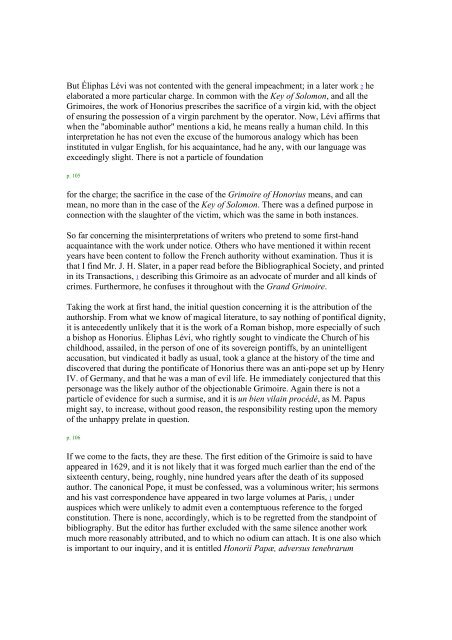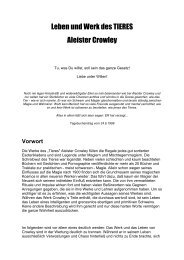The Book of ceremonial Magic
The Book of ceremonial Magic
The Book of ceremonial Magic
You also want an ePaper? Increase the reach of your titles
YUMPU automatically turns print PDFs into web optimized ePapers that Google loves.
But Éliphas Lévi was not contented with the general impeachment; in a later work 2 he<br />
elaborated a more particular charge. In common with the Key <strong>of</strong> Solomon, and all the<br />
Grimoires, the work <strong>of</strong> Honorius prescribes the sacrifice <strong>of</strong> a virgin kid, with the object<br />
<strong>of</strong> ensuring the possession <strong>of</strong> a virgin parchment by the operator. Now, Lévi affirms that<br />
when the "abominable author" mentions a kid, he means really a human child. In this<br />
interpretation he has not even the excuse <strong>of</strong> the humorous analogy which has been<br />
instituted in vulgar English, for his acquaintance, had he any, with our language was<br />
exceedingly slight. <strong>The</strong>re is not a particle <strong>of</strong> foundation<br />
p. 105<br />
for the charge; the sacrifice in the case <strong>of</strong> the Grimoire <strong>of</strong> Honorius means, and can<br />
mean, no more than in the case <strong>of</strong> the Key <strong>of</strong> Solomon. <strong>The</strong>re was a defined purpose in<br />
connection with the slaughter <strong>of</strong> the victim, which was the same in both instances.<br />
So far concerning the misinterpretations <strong>of</strong> writers who pretend to some first-hand<br />
acquaintance with the work under notice. Others who have mentioned it within recent<br />
years have been content to follow the French authority without examination. Thus it is<br />
that I find Mr. J. H. Slater, in a paper read before the Bibliographical Society, and printed<br />
in its Transactions, 1 describing this Grimoire as an advocate <strong>of</strong> murder and all kinds <strong>of</strong><br />
crimes. Furthermore, he confuses it throughout with the Grand Grimoire.<br />
Taking the work at first hand, the initial question concerning it is the attribution <strong>of</strong> the<br />
authorship. From what we know <strong>of</strong> magical literature, to say nothing <strong>of</strong> pontifical dignity,<br />
it is antecedently unlikely that it is the work <strong>of</strong> a Roman bishop, more especially <strong>of</strong> such<br />
a bishop as Honorius. Éliphas Lévi, who rightly sought to vindicate the Church <strong>of</strong> his<br />
childhood, assailed, in the person <strong>of</strong> one <strong>of</strong> its sovereign pontiffs, by an unintelligent<br />
accusation, but vindicated it badly as usual, took a glance at the history <strong>of</strong> the time and<br />
discovered that during the pontificate <strong>of</strong> Honorius there was an anti-pope set up by Henry<br />
IV. <strong>of</strong> Germany, and that he was a man <strong>of</strong> evil life. He immediately conjectured that this<br />
personage was the likely author <strong>of</strong> the objectionable Grimoire. Again there is not a<br />
particle <strong>of</strong> evidence for such a surmise, and it is un bien vilain procédé, as M. Papus<br />
might say, to increase, without good reason, the responsibility resting upon the memory<br />
<strong>of</strong> the unhappy prelate in question.<br />
p. 106<br />
If we come to the facts, they are these. <strong>The</strong> first edition <strong>of</strong> the Grimoire is said to have<br />
appeared in 1629, and it is not likely that it was forged much earlier than the end <strong>of</strong> the<br />
sixteenth century, being, roughly, nine hundred years after the death <strong>of</strong> its supposed<br />
author. <strong>The</strong> canonical Pope, it must be confessed, was a voluminous writer; his sermons<br />
and his vast correspondence have appeared in two large volumes at Paris, 1 under<br />
auspices which were unlikely to admit even a contemptuous reference to the forged<br />
constitution. <strong>The</strong>re is none, accordingly, which is to be regretted from the standpoint <strong>of</strong><br />
bibliography. But the editor has further excluded with the same silence another work<br />
much more reasonably attributed, and to which no odium can attach. It is one also which<br />
is important to our inquiry, and it is entitled Honorii Papæ, adversus tenebrarum
















